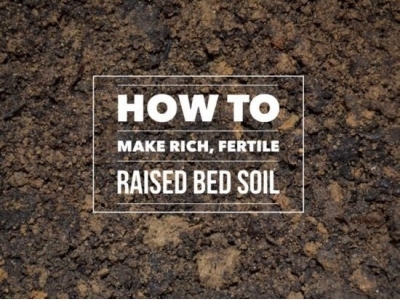How To Make Your Own Raised Bed Soil

Don't want to spend too much money on commercial soil? Make good grade soil yourself using this guide.
You have chosen to garden in raised beds. The frames are set and it is time to fill them with fertile soil that will serve as a good growing medium for your garden plants.
One option is to buy a good grade of commercial soil, but that can easily break the bank. The best solution is to make your own.
You night want to start by taking a soil sample from the garden. Have it tested at a reputable laboratory. It is best to choose one close to your location. The test results can help determine what you need to add to the soil to improve it. Fertile, well-drained soil will provide a much better growing medium than that of tightly compacted dirt that lacks nutrients.
What constitutes fertile, healthy soil? It includes a mixture of minerals, organic matter, air and water. The organic matter can be either plant or animal material such as manure that has gone through the composting process. It is called humus when completely decomposed.
The ideal soil sample has a granular, crumbly structure that provides good drainage. The loose soil will also allow oxygen and carbon dioxide to flow freely within the dirt.
A basic recipe for making your own soil is to use equal volumes of peat moss, coarse vermiculite and compost. A garden bed that is 4-feet by 4-feet square will need eight cubic feet of the mixture. This mixture will be high in nutrients and should promote good plant growth. The compost helps keep the soil loose. The vermiculite and peat moss help retain water.
If for some reason you cannot make your own soil, add organic matter to your dirt to promote fertility. Organic matter such as composted plant and animal products such as manure helps the soil retain nutrients that the garden plants need to grow. Adding organic matter to sandy soil aids in water retention. Adding organic matter to clay soil helps to loosen the dirt.
Adding mulch to the raised garden beds is another means of adding organic matter. However, you may not realize the benefits (other than helping to eliminate weeds) right away, but the mulch will break down over time and serve as a good source of additional organic matter.
Making your own compost is easy to do and it helps keep vegetable, fruit and yard waste out of our landfills. It can be as simple as collecting the trash bags your neighbors fill with leaves. Poke a few holes in the bags close to the top and bottom. This allows oxygen and water to enter the bags and allows carbon dioxide and excess water to escape. Add a shovel of garden soil to the bags. Add a little water to the bags. Mix by rolling the bag on the ground. It is a good idea to roll the bags every few weeks. Voila. Come spring, you’ll have a source of fertile nutrients you can add to your raised garden beds.
Related news
 How To Dry Herbs From the Garden
How To Dry Herbs From the Garden Drying herbs is the healthiest and most traditional way to preserve herbs for later use. There are several methods for drying herbs
 How to Weed the Organic Lawn
How to Weed the Organic Lawn As a result, more people are looking for organic ways to control weeds in their gardens.
 How to Make a Raised Bed Vegetable Garden
How to Make a Raised Bed Vegetable Garden Raised gardening beds have many benefits when growing your own food. Don't miss these tips on making a raised vegetable bed.